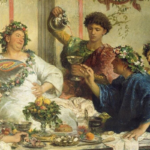The modern world would look remarkably different without the ingenuity and creativity of British inventors. Throughout history, the United Kingdom has been a breeding ground for innovative ideas that have shaped everyday life, enhanced technology, and progressed various fields. These 25 British inventions stand as a testament to the remarkable intellect and resourcefulness of the people of Britain. Let’s dive into this fascinating list!
1. The Steam Engine (James Watt, 1776)
Arguably one of the most significant inventions of the Industrial Revolution, James Watt’s improvements to the steam engine propelled industries and transportation into a new era.
2. The Telephone (Alexander Graham Bell, 1876)
Although there’s some debate about whether Bell invented the first telephone, he was born in Scotland and made crucial advancements that revolutionized global communication.
3. The Television (John Logie Baird, 1926)
Scottish inventor John Logie Baird is credited with the first working television system, fundamentally transforming the way people consume entertainment and information.
4. The World Wide Web (Tim Berners-Lee, 1989)
In a digital age, Tim Berners-Lee’s creation of the World Wide Web at CERN has become the backbone of modern communication, commerce, and connectivity.
5. The Hovercraft (Sir Christopher Cockerell, 1955)
Sir Christopher Cockerell invented the hovercraft, a vehicle capable of traveling on water and land. This innovation opened up new avenues for transport and rescue operations.
6. The Bicycle (John Kemp Starley, 1885)
While bicycles have been around for centuries, John Kemp Starley’s design of the “safety bicycle” introduced a safer and more stable riding experience, leading to the modern bikes we know today.
7. The Light Bulb (Joseph Swan, 1878)
Though Thomas Edison is often credited with the invention of the light bulb, it was British physicist Joseph Swan who created the first practical incandescent light bulb, lighting up homes and streets alike.
8. The Antibiotic (Alexander Fleming, 1928)
The discovery of penicillin by Scottish bacteriologist Alexander Fleming marked the beginning of modern antibiotics, saving millions of lives and drastically changing medicine.
9. The Jet Engine (Sir Frank Whittle, 1937)
Sir Frank Whittle’s development of the jet engine revolutionized air travel, making it faster and more efficient, ultimately paving the way for commercial aviation as we know it.
10. The Nuclear Reactor (Sir Ernest Rutherford, 1934)
Sir Ernest Rutherford’s pioneering research laid the groundwork for nuclear physics and the development of nuclear reactors, which play a significant role in energy generation.
11. The Postage Stamp (Sir Rowland Hill, 1840)
Sir Rowland Hill’s introduction of the penny black, the world’s first adhesive postage stamp, revolutionized postal systems and established prepayment for mail.
12. The Computer (Charles Babbage, 1837)
Charles Babbage is known as the “father of the computer” for his designs of the Analytical Engine, which encapsulated the principle of a programmable computer.
13. The Vaccination (Edward Jenner, 1796)
Edward Jenner’s development of the smallpox vaccine marked the start of immunology and has saved untold numbers of lives by preventing disease.
14. The Safety Match (Samuel Jones, 1827)
While matches existed before, Samuel Jones created a safer version, eliminating dangerous materials and making lighting fires accessible and safe for daily use.
15. The Multitouch Interface (Bill Buxton and others, 1980s)
While commonly associated with modern smartphones and tablets, developments in multitouch technology have their roots in British research, enhancing how we interact with devices.
16. The Modern Sewing Machine (Thomas Saint, 1790)
Thomas Saint’s design of the first practical sewing machine laid the groundwork for modern garment making, transforming the fashion industry.
17. The Gas Mask (John H. Stenhouse, 1854)
The gas mask was significantly influenced by British inventors, providing critical protection for soldiers in World War I and saving countless lives in chemical warfare.
18. The Iron Lung (Philip Drinker and Charles F. Dalton, 1927)
While not solely a British invention, the iron lung was popularized in the UK to help patients suffering from polio, serving as a crucial piece of medical technology.
19. The Plastic (Alexander Parkes, 1856)
Alexander Parkes invented Parkesine, the first synthetic plastic, opening up a world of possibilities in material science and manufacturing.
20. The Analogue Computer (Harold Stephen Black, 1927)
Harold Stephen Black’s contributions to electrical engineering advanced computation, leading to significant developments in digital computing.
21. The Chocolate Bar (Joseph Fry, 1847)
Joseph Fry invented the first modern chocolate bar, taking chocolate from a luxury drink to an accessible treat that millions enjoy today.
22. The Wind-Up Radio (James A. McBain, 1960s)
This invention allowed people in remote areas without electricity to receive news and communication, promoting education and enlightenment during critical times.
23. The Fridge (James Harrison, 1856)
The refrigerator as we know it today was significantly influenced by British inventor James Harrison’s early designs, which changed the food industry forever.
24. The Selfie Stick (Wayne Fromm, 1980s and influenced by British designs)
Though its modern rendition gained fame recently, earlier versions of the selfie stick have been attributed to various British designs and concepts.
25. The Snorkel (Hugh Bradner, 1940s)
Originally developed for U.S. Navy divers, Hugh Bradner’s design has been popularized by British snorkel enthusiasts, making underwater exploration accessible for all.



GIPHY App Key not set. Please check settings